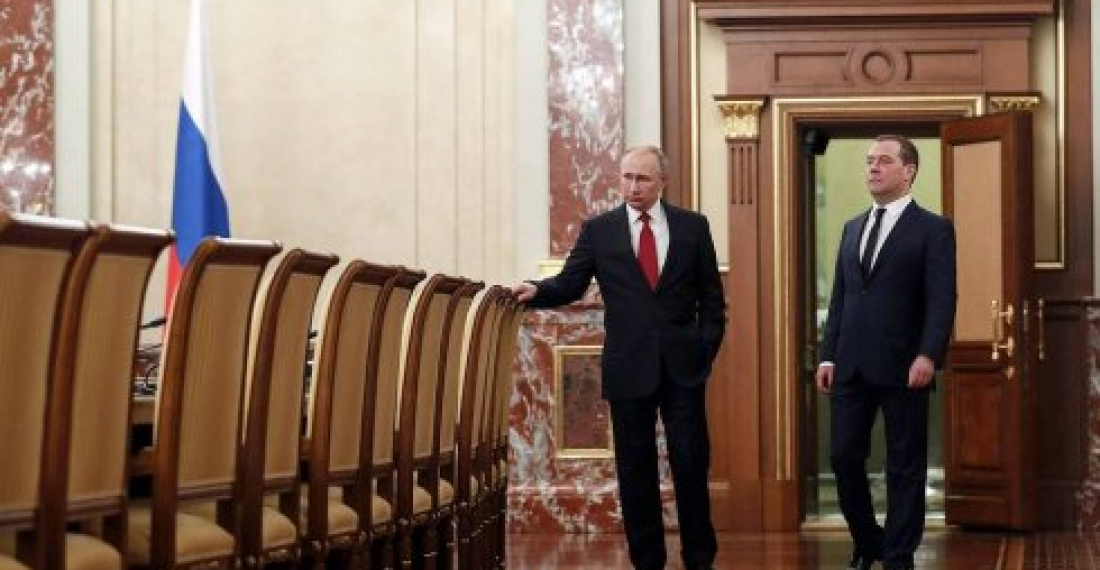Vladimir Putin decided to start the new year with a little bit of political drama of his own. On Wednesday (15 January), as Russians were slowly making their way back to work after an extended new year holiday, Putin used his annual address to Parliament to propose constitutional changes that would give him scope to extend his grip on power after leaving the presidency, and picked a new prime minister after Dmitry Medvedev unexpectedly announced the resignation of the government in response to Putin's speech.
The dramatic moves were widely seen as preparing the ground for 2024, when Putin, now 67, is obliged to leave the presidency after occupying the Kremlin or the prime minister's job continuously since 1999. In his speech Putin indicated that the cap on maximum two terms for a president will not be changed, thus ruling out his continued role as president. But it seems everything else is up for grabs, and the Kremlin appears set for another round of musical chairs, with key players changing job titles, but where power remains very much in the same hands. As if to emphasise the point, the Russian news agency TASS ran the story with a picture of Putin and Medvedev next to a row of chairs.
Putin has now nominated Mikhail Mishustin, 53-year-old head of the Russian Tax Service as the new prime minister, but he also announced he would install Medvedev as Deputy head of the National Security Council, a position which has not hitherto existed. He also proposed revamping the role of the State Council, creating another centre of power, as well as giving more power to the parliament in the appointment of the prime minister. Quite where Putin sees himself in this new power constellation remains a mystery.
According to the Deputy Chair of the Russian Federation Council Committee on Constitutional Legislation and State Building, Senator Yelena Mizulina, the vote on the Constitutional changes triggered by Putin's speech may take place in September. "A vote of this kind may take place in September, on the single voting day. As far as I understand, the president already has certain variants of those amendments. It will not be a referendum on a draft constitution, it will be a citizens' vote and their stance on concrete initiatives, related to the proposed amendments".
Moving quickly, on Thursday Putin signed a decree establishing a working group to prepare the constitutional amendments. The group, has three co-chairs: Andrey Klishas and Pavel Krasheninnikov, who preside committees on legislation and state building at the upper and lower chambers of the Russian parliament, respectively, and by the head of the Institute of Legislation and Comparative Law under the Government of the Russian Federation, Taliya Khabriyeva. The body would comprise 75 politicians, legislators, scientists and public figures.
Among the group's members are Rusfond charity organization's President Lev Ambinder, Ataman (head) of the Kuban Cossack society Nikolay Doluda, former pole vaulter and two-time Olympic champion Yelena Isinbayeva, Head of the Union of Theatrical Figures of Russia Alexander Kalyagin, Kaspersky Lab co-founder Natalya Kasperskaya, President of the Chamber of Commerce and Industry Sergei Katyrin, renowned pianist Denis Matsuyev, actor Vladimir Mashkov, Director of St. Petersburg Hermitage Museum Mikhail Piotrovsky, internationally acclaimed pediatric surgeon and President of Research Institute of Emergency Pediatric Surgery and Traumatology Leonid Roshal, Head of the Russian Union of Journalists Vladimir Solovyev, State Tretyakov Gallery Director General Zelfira Tregulova, Mosfilm studio Director General Karen Shakhnazarov, President of the Russian Union of Industrialists and Entrepreneurs Alexander Shokhin and others.
The inaugural meeting of the newly-formed working group will take place on Thursday, one of the group's co-chairs, Klishas said.
source: commonspace.eu with agencies
photo: President Putin of Russia with outgoing prime minister Dimitri Medvedev appear to be admiring a row of chairs in this picture carried by the Russian news agency TASS in its report of the story of political changes in Moscow following the presidential address to parliament on 15 january 2020. (picture courtesy of TASS news agency, Moscow).






